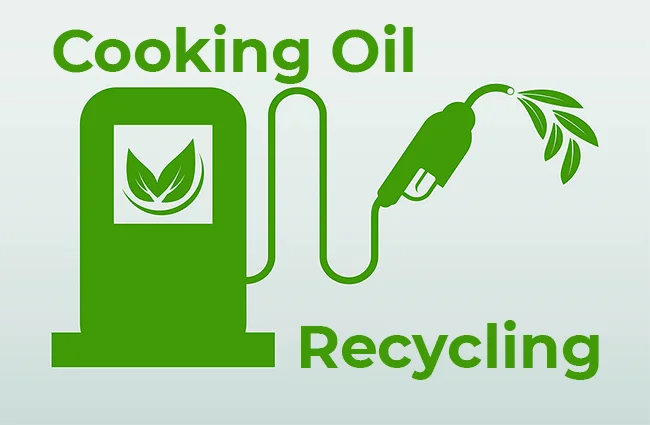Cooking oil is essential in many kitchens and is used in countless dishes. However, after its use, it can become a waste problem. Improper disposal of cooking oil can harm the environment, but recycling it can turn it into a valuable resource. In this blog, we’ll explore how cooking oil recycling benefits the environment and supports sustainability and ecological health.
Reducing Environmental Pollution
Improperly disposing of cooking oil, like pouring it down the drain, can cause serious environmental problems. When oil enters the sewage system, it can solidify and block pipes, leading to sewage overflows. These overflows can pollute water bodies, harm aquatic life, and disrupt ecosystems. Cooking oil can also coat water surfaces, reducing oxygen levels and threatening marine organisms.
Recycling cooking oil helps avoid these issues. Recycled oil can be used to make various products, preventing pollution and keeping our waterways and ecosystems healthier.
Conserving Natural Resources
Producing cooking oil, whether from plants or animals, uses a lot of natural resources. Growing crops for vegetable oil needs land, water, and fertilizers. Animal fats come from livestock farming, which also requires significant resources.
Recycling cooking oil helps reduce the need for new oil, conserving these resources. Bulk cooking oil suppliers in Melbourne play a crucial role in this process by providing large quantities of oil for both initial use and recycling purposes. By reusing oil, we lower the demand for fresh oil and lessen the environmental impact of its production. This conservation supports sustainable practices and reduces strain on our planet’s ecosystems.
Reducing Greenhouse Gas Emissions
The production and disposal of cooking oil contribute to greenhouse gas emissions. Growing oil crops and processing animal fats release carbon dioxide (CO2) and methane (CH4), which are strong greenhouse gases. Improper disposal, like landfilling, can also produce methane as the oil breaks down.
Recycling cooking oil into biodiesel helps reduce these emissions. It emits much less greenhouse gas than regular diesel. By
Promoting Sustainable Energy
Biodiesel made from recycled cooking oil is a great example of sustainable energy. It can power vehicles, machinery, and heating systems. Unlike fossil fuels, which are limited and harmful to the environment, biodiesel is renewable and can be made from various sources, including used cooking oil.
Using biodiesel from recycled oil helps diversify our energy sources and reduces our dependence on fossil fuels. This move towards renewable energy is important for long-term environmental sustainability and energy security.
Supporting Circular Economy
The circular economy focuses on reusing resources, reducing waste, and supporting sustainability. Cooking oil recycling is a great example of this idea. Instead of throwing away used cooking oil, it is collected, processed, and turned into valuable products like biodiesel, animal feed, and industrial lubricants.
By including cooking oil recycling in our waste management, we create a system where waste is continuously repurposed. This method not only lessens environmental impact but also boosts economic growth by creating new markets and job opportunities in recycling and renewable energy.
Enhancing Waste Management Practices
Proper waste management is crucial for environmental health and public safety. Recycling cooking oil helps by keeping waste out of landfills and sewage systems. This reduces the strain on waste treatment facilities and lowers the risk of environmental contamination.
Many communities and organizations now offer cooking oil recycling programs, making it easier to dispose of used oil responsibly. These programs often include collection points or pick-up services to ensure the oil is processed and recycled efficiently. By joining these programs, individuals and businesses can contribute to effective waste management.
Economic Benefits
Recycling cooking oil benefits both the environment and the economy. It creates new business opportunities and jobs in areas like waste collection, processing, and biodiesel production. Businesses that recycle their cooking oil can also save on disposal costs and may even earn money by selling their used oil to recycling companies.
Encouraging Community Engagement
Community involvement is key to successful recycling programs. Cooking oil recycling often includes educational campaigns that inform people about its environmental and economic benefits. These campaigns encourage individuals and businesses to get involved, promoting community responsibility and environmental care.
By supporting cooking oil recycling, communities can unite towards shared environmental goals. This teamwork strengthens social connections and fosters a culture of sustainability, leading to a cleaner and healthier environment for everyone, now and in the future.
Conclusion
Recycling cooking oil provides many benefits for the environment, economy, and society. It helps reduce pollution, conserve natural resources, cut greenhouse gas emissions, and support sustainable energy. By recycling cooking oil, we also support a circular economy, improve waste management, and create economic opportunities.
Everyone can help make cooking oil recycling successful. By properly disposing of used cooking oil and supporting recycling programs, we turn waste into a valuable resource and positively impact the environment. Embracing cooking oil recycling is an easy yet important step toward a more sustainable and eco-friendly future.



Comments